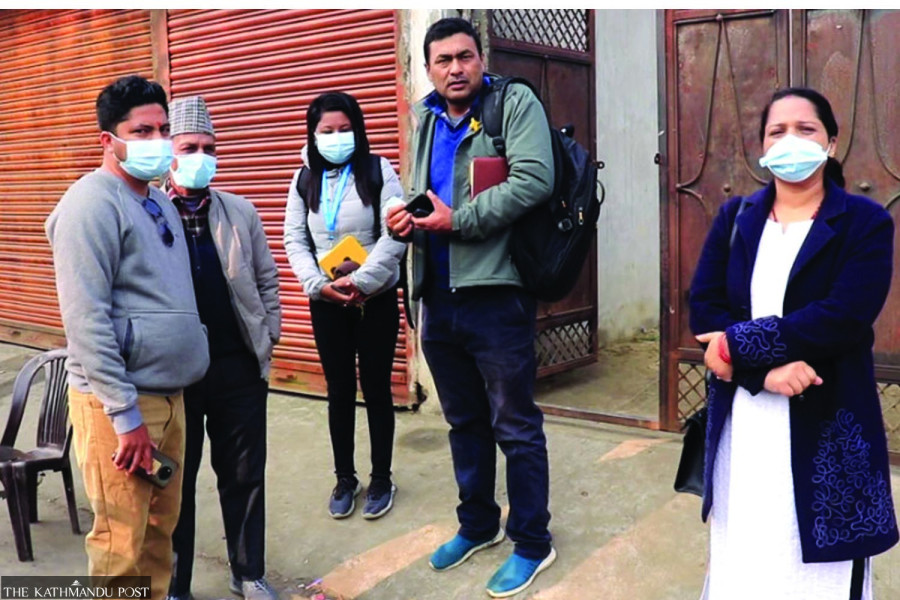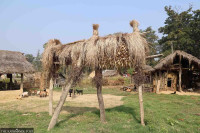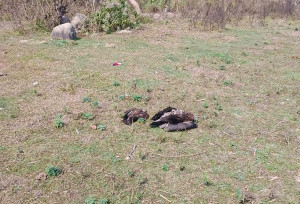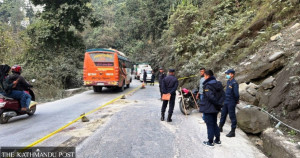Lumbini Province
One dead, 30 sick in measles outbreak
Children aged nine months to 15 years being vaccinated from today to tame viral disease.
J Pandey
Measles, a viral respiratory disease, has killed one and infected over 30 children in Nepalgunj in the past week, indicating that an outbreak is afoot.
A 31-month-old toddler died of the disease in Nepalgunj Sub-Metropolitan City-5 in Banke, a Tarai district in Lumbini Province, on Wednesday.
More than 30 children have fallen sick from the disease in various wards of the same local unit.
Measles is an extremely contagious infection, which spreads through respiratory droplets.
According to the District Public Health Office (DPHO), Banke, the disease is turning into an epidemic as the guardians of the sick children failed to seek immediate treatment.
The DPHO said it has taken initiatives to contain the outbreak by deploying health workers to the affected area.
Following the toddler’s death, the DPHO held an emergency meeting on Thursday to control the spread of the disease and wrote to the local government [Nepalgunj Sub-metropolis] for assistance. According to the health office, the outbreak has spread to the sub-metropolis's wards 5, 7, 8, 9, 10, 11, 14, 15 and 20 as of Thursday.
“We have started providing treatment to the infected children in their own homes,” said Sunita Paudel, chief at the DPHO. “A child died of measles before he came into contact with the health workers. We are searching for patients in every ward to control the disease from spreading further.”
Preparations are on to soon launch a vaccination drive against measles in the affected area, she added. According to her, 4,500 doses of measles vaccines have arrived in Banke.
On Saturday, samples of five children from the same family in Nepalgunj-5 were sent to Kathmandu for tests. Four of the children, including the deceased one, were diagnosed with measles infection during the laboratory tests.
Health workers and technicians from the World Health Organisation, UNICEF, the District Public Health Office and the health unit of Nepalgunj Sub-Metropolitan City have been mobilised in the area following the outbreak.
A health worker from the basic health centre at ward 5 who was deployed to monitor and track down measles patients has also fallen sick.
According to the DPHO, children between the ages of nine months and 15 years have contracted the disease. The health office said it is collecting data on the infected people. According to Ram Bahadur Chand, the chief of the health unit of Nepalgunj Sub-Metropolitan City, almost all the infected children had not received a measles vaccination. “Health workers will administer vaccines against measles to the children between nine months to 15 years from Friday,” said Chand.
A 2022 report by the World Health Organisation (WHO) and UNICEF warned that there could be a significant increase in the number of measles cases around the world. The report cites low global vaccination rates in the past few years as the main driver of this increase.
Seven years ago, two children died of measles at ward 5 of the sub-metropolis. But the sub-metropolis has not launched any programme against measles citing a lack of budget. “We don’t have the budget to tackle this health issue. We don’t have the resources to launch an awareness campaign,” said Tej Oli, a health officer at the sub-metropolis’s health unit.
Early symptoms, which usually appear 10-12 days after infection, include high fever, runny nose, bloodshot eyes and white tiny spots inside the mouth. Several days later, a rash develops on the face, upper neck and other parts of the body. It is one of the most easily spread viruses among humans and is particularly dangerous for children.
Nepal had committed to eliminating measles and rubella viruses by 2019 but due to its inability to meet the target, the Health Ministry has extended the deadline to 2023. To meet the target, coverage of both regular immunisation and special campaigns should be at 95 percent, which seems impossible in the existing context.
The Nepal government launched a routine measles vaccination programme in the late 1980s. However, measles continues to stalk many children across the country.




 22.3°C Kathmandu
22.3°C Kathmandu















